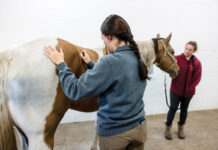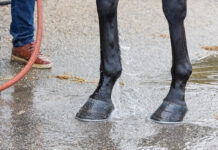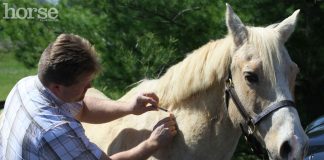
A. Colic can be a serious and life-threatening condition if there is any compromise to the bowel or the blood supply to the bowel. For this reason, contact your vet for a colic that doesn’t resolve on its own (without drugs) after about an hour. During this time period, you can do a few things: First, take his vital signs. Get his rectal temperature, heart rate, and evaluate his mucous membrane color, capillary refill time, and listen for intestinal sounds on both sides of his flanks. Knowing your horse’s normal vital signs gives you a basis of comparison when he is acting ill. Record this information and continually update it as the colic progresses, and relay this data to your vet when you call. Then your vet will have a good idea of how urgent the colic might be and how quickly veterinary attention needs to be delivered.
Another thing you can do is put your horse on a longeline or in the round pen and move him at a vigorous trot for 10 to 15 minutes, provided he doesn’t have a musculoskeletal problem that requires strict rest. Sometimes the jiggling motion of a steady trot will work some gas bubbles through his system and resolve the bellyache.
Any unrelenting or severe pain necessitates immediate professional veterinary care. If your horse is only mildly painful, depressed or off feed, then you might have the luxury of monitoring him for an hour or two before requesting a visit from your vet. A horse in distress for more than an hour should receive immediate vet care. It is always better to implement rapid veterinary treatment so that a problem is forestalled early on. Veterinary treatment with pain medications and oral or intravenous fluids helps maintain intestinal motility and hydration; however, not all colic is related to intestinal issues, and a thorough veterinary exam on a colicky horse can rule in or out other serious problems.
Further Reading
Colic Surgery Guide
Accupressure for Colic
Colic Prevention Tips
Nancy S. Loving, DVM, is a performance horse veterinarian based in Boulder, Colo. She is also the author of All Horse Systems Go.







with colic be safe rather than sorry!!! i had a horse die of colic! its terrible!!!!
colic is a nightmare!
this is really great advice i thought my horse had colic but it had tumors
Colic is a nightmare, My dad had to make the hard decision of putting our oldest horse down due to colic…I never want to see that happen again..it’s to upsetting
hum
I’m surprised about the vigorous trot suggestion. School of thought different these days?
The article is a helpful guideline to follow. I would like to add that letting the horse rest is also an accepted action to take if the horse is not in extreme distress and lays down quietly. It is no longer considered a good thing to walk your horse incessently if he is in pain as too many people walk their horse to exhaustion.
Wow! I think that first hour would be the longest hour of my life! And to trot my best friend while she is in pain? I don’t know about that. But perhaps things are changing.
I Currently just lost my 11 year old pregnant mare to colic. She was about 7 months into pregnancy. When we finnaly had to put her down she was on major pain medications, couldn’t walk, and could barly hold up her head. I have had horses colic before in my life. I’m not so sure about the whole trotting thing. But I deffinatly know that calling the vet as soon as you can is a major role in how soon your horse is feeling better. I normaly walk my horse around unless they are just laying down and not rolling around… Just a Few thoughs from me 😛
I just spent the nite with my beloved horse after his first (& I hope LAST)colic scare. It was the longest hour of my life waiting for the vet and I called her after 1/2 hour of monitoring his vitals and watching his behavior. My instincts really kicked in and I new this situation would not work out with out the Vet’s care. I know in my horses case, a vigorous run would have made him even more miserable. We all just need to remember that every situation is different.
We are in the middle of our first bout of colic with our 20+ gelding. It has been a horrible day and very scary. Our daughter is at college, I am out of town and my husband found him this morning at feeding time. He got him on his feet numerous times and we called the vet. The vet gave him pain meds and said to keep walking him. My husband has walked and rested and brushed him down in intervals It is 7:00 pm and he is starting to act better, pass gas and perk his ears up when I talk to him over the phone.
My 27 year old horse just finnished dealing with impactive colic and it was not fun. She wasn’t pooping, she was swetting, she was rolling and not eating. We were really scared. We called the vet and when he came he did everything he could possibly do. He pumped her with mineral oil, he gave her some Bute, and then told us”I don’t think she’ll be standing tommarrow morning. This is bad.” But the next morning, the next week, and the next month she is still standing. My mom and I walked that horse for 19 hours a day taking shifts. We loved our horse so much that we were willing to do that. So if your horse has colic and you love them you can save them if you work at it. and that’s why I’m doing a speech on Colic. If you want to know more about colic or what’s called intestinal catastrophe on horsechannel.com search colic surgical guide and hope your horse never has to go through it.
Our 26 year old quarter horse mare just died from colic. This was our first dealing with colic. The vet said was probably a twisted gut or blockage.
Kendra, Sometimes, no matter how much you love your horse, there is nothing that you can do. No matter how hard you try. So please don’t make it sound like people’s horses that don’t survive colic died because they didn’t try or love their hores hard enough.
Thanks for the info on colic!! If this every happens to my horse i’ll deff. try these things!
Lost 3 horses to colic… its horrible.
There is a horse at the barn I board at who doesn’t drink enough water, and therefore colics easier than other horses. We have to feed him mash for each meal to ensure he gets some water, but he still colics about once a month. I’m glad to see from this article that we are doing the right things, and hope that his cases remain mild.
Good article.
Good article. My vet also said that alot of colic cases are fixed up on the trailer ride to vets office, which happens at their clinic alot.
Great article. I have had great success with a “drench” using a large pop bottle filled with warm water and baking soda – 1/2 cup mixed together. I use the biggest syringe that I have and slowly squirt the solution down into the corner of the horses mouth – between cheek and gumline. It takes about 20 mins. to work and the horse is out of gas pain and eating again.
Years ago my girlfriend called me early one morning to come over and wait with her as the vet was coming to put her horse down.
They had been up all night walking, mineral oil, etc. and her mare was getting worse. Hind legs were crossing at the hocks and she looked like she was going to go down at any moment when they were trying to keep her walking. I tried my mixture and 20 mins. later she was on her feet looking for something to eat. When the vet arrived to put her down he could not believe the transformation. I told him he owed me a consultation fee! lol.
This may not work for all horses depending on the type of colic they have, BUT it certainly won’t hurt and may save a life!
I learned this tip from a horse book from the 1800’s and from a dairy farmer I was buying hay from one day.
Great Article!
Cool!